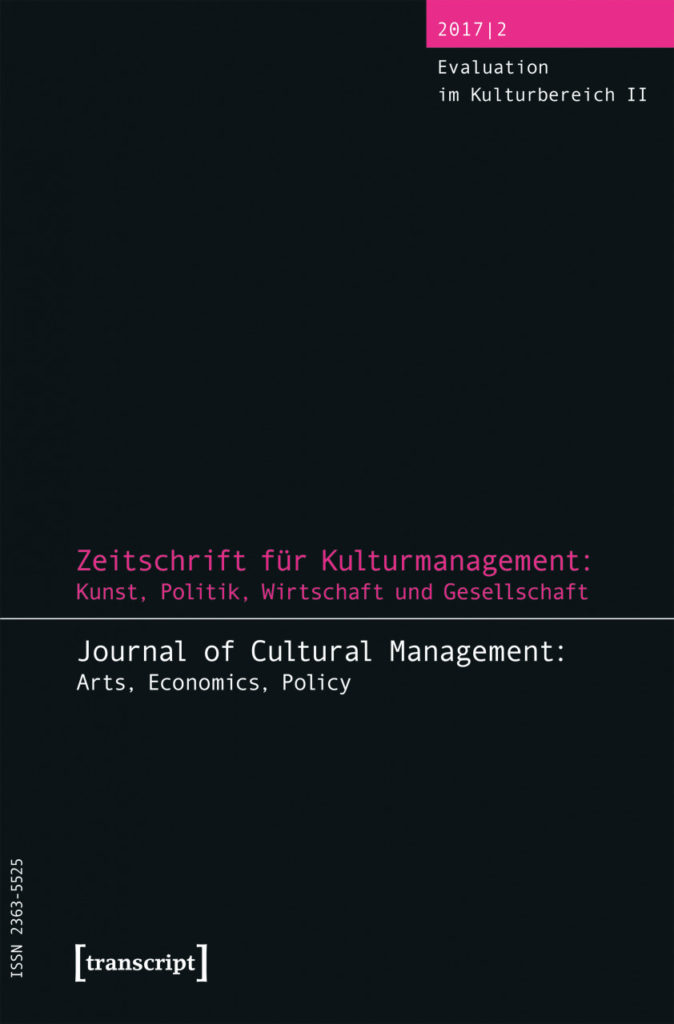Research Article
Social Desirability’s Influence on Audience Research
Discerning and Reducing It
Abstract
The term ‘social desirability bias’ (SD bias) is used to describe a systematic tendency to adapt one’s behavior or communication to conform to perceived social norms. While SD bias, which can affect the validity of empirical studies, has received considerable attention in psychological research, it has yet to be examined in the context of the fine and performing arts. This study is among the first to provide empirical evidence for high trait desirability (TD) in the cultural sector and a resultant SD bias. It shows that due to SD bias, audiences in the cultural sector are more likely to give misleading positive feedback. It is therefore incumbent on researchers in the cultural sector to integrate an awareness of and possibilities for mitigating SD bias at all stages of their studies. This paper offers several specific suggestions on how this can be done.
Keywords
2017 (2)
Evaluation im Kulturbereich II

Related Articles
Crisis of succession: On the institutionalization of charismatic rule in German theatre
Journal of Cultural Management 2019 (2)
Research Article
Journal of Cultural Management and Cultural Policy
Research Article
Journal of Cultural Management 2017 (1)
Case Study
Das Theaterpublikum
Veränderungen von der Aufklärung bis in die GegenwartYearbook for Culture Management 2012
Research Article
Yearbook for Culture Management 2012
Research Article
Crucial Quality Features of Visual Artists’ and DIY-Musicians’ YouTube Channels
Journal of Cutural Management and Cultural Policy
Research Article
© 2026, Journal of Cultural Management and Cultural Policy
Keywords
- Aesthetics
- Higher Education
- Cultural Diplomacy and Foreign Cultural Policy
- Occupation
- Career and Professional Role
- Audience Development
- Audience Studies and Visitor Studies
- Visitor Motivations
- Business
- Covid Pandemic
- Democracy
- Digitalization
- Diversity
- Third Sector
- Empirical Aesthetics
- Development
- Ethics
- Evaluation
- Field Theory
- Festival
- Film
- Federalism
- Community Arts
- Societal Change
- Ideology
- Staging
- Career
- Communication
- Concert
- Creative Industries
- Creativity
- Crisis
- Culture
- arts organizations, cultural organizations
- Cultural Participation
- Cultural Change
- Fincancing The Arts
- Cultural Promotion Law
- Cultural History
- Cultural Management
- Cultural Economy
- Cultural Organizations
- Art Education
- Cultural Policy
- Cultural Production
- Cultural Sociology
- Art Education
- Cultural Understanding
- Arts Administration
- Cultural Industry
- Cultural Sciences
- Art
- Art Field
- Arts Research
- Artists
- Artistic Research
- Artistic Reputation
- Arts Management
- Arts Organizations
- Art education
- Arts Marketing
- Arts Administration
- Curating
- Leadership
- Literature
- Advocacy
- Management
- Marketing
- Market
- Media
- Methods Development
- Mexico
- Monumentalizing
- Museum
- Music
- Non-Visitor Studies
- Opera
- Orchestra
- Organization
- Political Expression
- Post-truth Politics
- Professional Role
- Audience
- Audience Development
- Law
- Government
- Role
- Socially Engaged Art
- Social Cohesion
- Social Change
- Social Cohesion
- Non-visitor Socio-demographics
- Socioculture
- State
- Symbolic capital
- Dance
- Participatory Justice
- Theatre
- Theatre Governance
- Theory Development
- Tourism
- Transformation
- Survey
- Entrepreneurship
- Urbanism
- Civil Society


